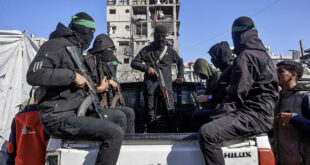China on Wednesday blocked a United Nations Security Council measure that would have blacklisted the Pakistani founder of Jaish-e-Mohammed, the militant group that nearly brought South Asia to the brink of war last month after one of its suicide bombers attacked Indian forces.
The vote was the council’s fourth attempt to blacklist the founder, Masood Azhar, in a decade and was proposed by the United States with the support of France and Britain. Since 2009, the Indian government has tried to designate Mr. Azhar as a global terrorist for orchestrating the 2001 attack on India’s Parliament and the 2008 Mumbai terrorist attacks, which killed more than 160 tourists and local civilians.
But every attempt has been blocked by China, which has served as a shield for Pakistan internationally as the two countries strengthen their military and economic ties.
A spokesman for the Chinese mission at the United Nations did not immediately respond to a request for comment about the decision, which came during a closed Security Council meeting. When China vetoed previous attempts to list Mr. Azhar, it claimed India had not provided enough information to support the designation, a claim that New Delhi denied.
As a permanent member of the Security Council, China has the authority to veto any measure. Its stance on Mr. Azhar has proved particularly frustrating to some council members.
In recent weeks, as international pressure has risen over Pakistan’s ties to terror groups, Islamabad has scrambled to show it is taking action against them — closing nearly 200 religious schools and arresting dozens of individuals linked to militancy. But American and European officials say they are waiting to see if the crackdown is effective or if the militants’ infrastructure will spring back to life once international pressure on Islamabad subsides.
The momentum to blacklist Mr. Azhar had gained new urgency. Last month, a suicide bomber claiming allegiance to Jaish-e-Mohammed slammed his explosives-laden vehicle into an Indian paramilitary convoy in the disputed region of Kashmir, killing 40 soldiers.
India retaliated by sending fighter jets inside Pakistan for the first time in nearly five decades to hit what it claimed was a training camp belonging to Jaish-e-Mohammed. The episodes spurred fears of military escalation between the two rivals, both of which have nuclear weapons.
Although Jaish-e-Mohammed has been blacklisted by the United Nations since 2001, Mr. Azhar is not specifically designated as a terrorist, allowing him to raise money for the group through front organizations inside Pakistan, according to Indian and American officials. Pakistan’s government denies that Jaish-e-Mohammed is active in Pakistan.
In 2010, Mr. Azhar was blacklisted by the United States Treasury Department, which prohibits American citizens from conducting transactions with him and has frozen any assets he holds in the country.
By listing Mr. Azhar at the United Nations, member states, including Pakistan, would be expected to take similar measures.
Mr. Azhar founded Jaish-e-Mohammed, or the Army of Mohammed, in 2000 in Pakistan, and has used the group to funnel weapons, cash and other support to the Taliban and Al Qaeda, according to the United States. The group’s core mission is to break Kashmir off from India and merge it with Pakistan.
One of the many charities Mr. Azhar operated was described by the United States Treasury Department as “one of the primary relief agencies that Al Qaeda used to move supplies” in Afghanistan.
On Tuesday, the United States had signaled its weariness with China over its attempts to block Mr. Azhar’s designation.
“The United States and China share a mutual interest in achieving regional stability and peace,” Robert Palladino, a State Department spokesman, said at a news conference in Washington. “A failure to designate Azhar would run counter to this goal.”
 Eurasia Press & News
Eurasia Press & News



